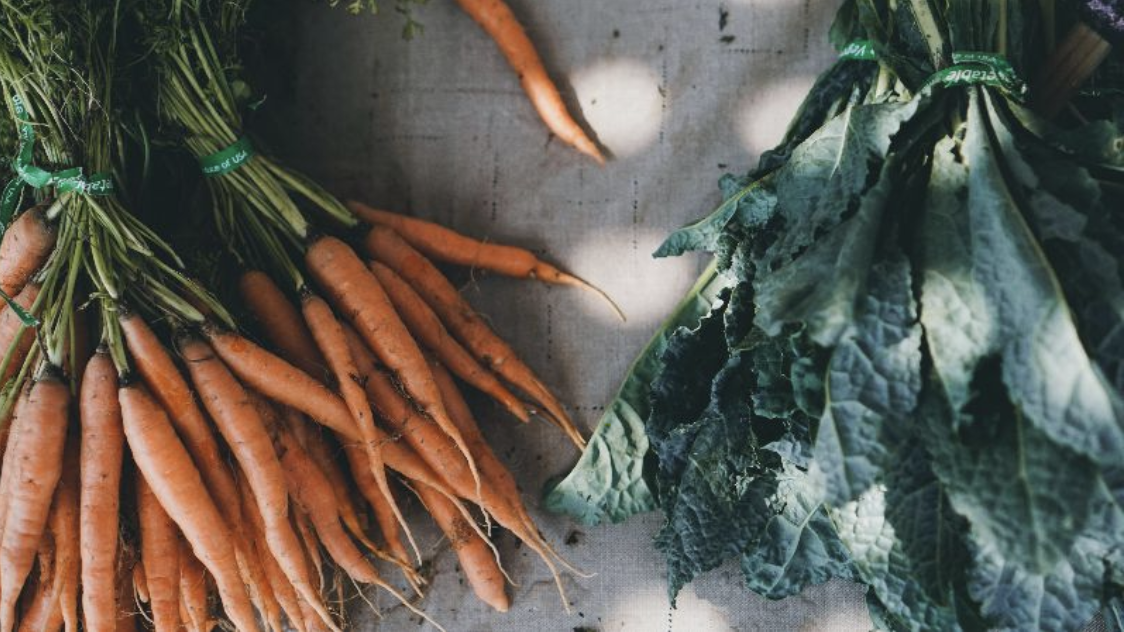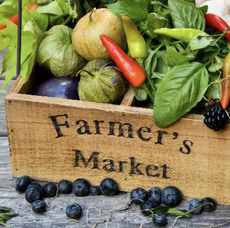At it's roots, naturopathic medicine is about treating the whole person. Naturopathic medicine does not just look at select symptoms, but rather dives into the root cause of how those symptoms came to be.
As a community dedicated to living a functional lifestyle, we need to look at food the same way naturopathic medicine looks at a person. This means taking the whole picture into account: what environment was the crop produced in, were pesticides/chemicals used, are they GMOs, where were these crops grown, even down to how they were packaged and sold. All of the pieces that go into our food to make it whole, need to be considered.
What does organic really mean?
Organic foods are products grown/raised and processed in accordance with federal organic guidelines. This means farmers selling certified organic product must meet soil standards, rely only on natural fertilizers and pesticides and raise animals in living conditions that mimic their natural behaviors as much as possible. Chemical fertilizers and synthetic pesticides and grains are prohibited in organic farming unless the process or product is approved by the USDA.
Organic and grass-fed is the first place to start with eating a whole food diet. Chemicals and pesticides wreak havoc on our hormones, endocrine system, DNA mutations and are linked to a plethora of other harmful effects in the human body.
Go local!
Local is just as important as organic. In high school science we learned the process of photosynthesis: how plants convert sunlight into energy to grow. That energy is then transferred to us when consumed. Think about how this applies to the food you eat.
When you are eating a banana from Chile in November, that product has been far removed from it's natural sunlight, spending weeks or more in artificial light and an artificial environment as it makes its way to your grocery store. The banana has lost much of the energy it obtained from the sun and therefore, is unable to pass on this lost energy to you.
Eating local helps your body obtain the highest levels of energy and nutrients from what you consume. Local food shares the same environment and sunlight as you and is matched to your natural, biological processes--this creates optimal function at the cellular level. The nutrients and energy from local food is also more bio-available for our bodies to use. Prioritizing local food is not only supporting the community, but supporting your health at the cellular level!
Things to consider:
What does organic really mean?
Organic foods are products grown/raised and processed in accordance with federal organic guidelines. This means farmers selling certified organic product must meet soil standards, rely only on natural fertilizers and pesticides and raise animals in living conditions that mimic their natural behaviors as much as possible. Chemical fertilizers and synthetic pesticides and grains are prohibited in organic farming unless the process or product is approved by the USDA.
Organic and grass-fed is the first place to start with eating a whole food diet. Chemicals and pesticides wreak havoc on our hormones, endocrine system, DNA mutations and are linked to a plethora of other harmful effects in the human body.
Go local!
Local is just as important as organic. In high school science we learned the process of photosynthesis: how plants convert sunlight into energy to grow. That energy is then transferred to us when consumed. Think about how this applies to the food you eat.
When you are eating a banana from Chile in November, that product has been far removed from it's natural sunlight, spending weeks or more in artificial light and an artificial environment as it makes its way to your grocery store. The banana has lost much of the energy it obtained from the sun and therefore, is unable to pass on this lost energy to you.
Eating local helps your body obtain the highest levels of energy and nutrients from what you consume. Local food shares the same environment and sunlight as you and is matched to your natural, biological processes--this creates optimal function at the cellular level. The nutrients and energy from local food is also more bio-available for our bodies to use. Prioritizing local food is not only supporting the community, but supporting your health at the cellular level!
Things to consider:
- Dirty dozen - This is a list of the 12 "dirtiest" fruits and vegetables based on pesticides and chemicals. If you are going to go organic on anything, make it these.
- Clean fifteen - Like the dirty dozen, this is a list of the top "cleanest" fruits and vegetables based on pesticides and chemicals used during production.
- Ways to find organic (and local) - Local, organic produce can be hard to find when searching for it on Google. Many of these places don't have websites and if they do, they are usually hard to navigate or on the 5th page of your google search. The best way to find local, organic produce is to find your local farmers market. Talk to the farmers and even if they don't sell organic produce, they will know what farmers in your area are. It's a great place to start and a nice way to get some fresh air and sunshine as well!
- Some processed foods are considered organic - If they contain "no artificial preservatives, colors, or flavors and require that [70%] their ingredients are organic, with some minor exceptions" (USDA). But processed food is still far removed from a natural form that we must limit our intake and focus on whole foods in the form of local organic vegetables, fruit and grass-fed meat.
| Websites Until you find the perfect farm for your needs, it can be hard navigating how to find local, organic farms that offer crops you are looking for. Thankfully, Local Harvest has created a database for farms, CSA, farmer's markets, and locally grown events. While not every farm is listed on this site, it's a great place to start your search since you can filter based on your location. |
| Recipes Make your farmer's market experience fun by going on a scavenger hunt for the ingredients in this Spanakopita Omelet! This lectin free, paleo, keto recipe will taste even better with fresh finds from local farms. |




 RSS Feed
RSS Feed